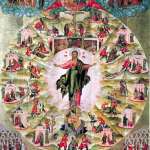
Everything which exists, insofar as it exists, is good. Everything receives its goodness from the first and greatest good, God. Thus, apart from God, everything exists is good, not in an absolute sense, coming from itself, but in a derivative sense, given to it from God. This is why the relative good of any existing thing differs from the goodness of God. Because of this, Boethius explained, the goodness of any contingent being not only can find itself reduced from what it had when it first came into existence, the good which it possesses can be used as a tool for some evil, that is, contrary to the greater good in which it was intended to be found (and in this fashion, contrary to justice):
For though they are good in virtue of their existence, they are not therefore like the first good, since their particular being is not good under all circumstances, but because the particular being of things cannot exist unless it is derived from the first being, that is, the good; therefore their particular being is good, but it is not like that from which it derives. For that it good in any condition in virtue of its existence; for it is nothing else than good. But if the former were not derived from that good, it could perhaps be good, but it could not be good in virtue of its existence. [1]
The fact that everything contains some good in them, even if that good has been corrupted, means that the good which remains can help redirect everything back to some greater good, and from that greater good to the greatest good, the good found in God:
Since herein we imitate the inestimable goodness of God, who bestows and imparts himself in due order to all; and who gives whatever he gives, to the intent that it should in turn be straightway transmitted by the receiver to another, so far as meet: that thus, by the gifts of God being distributed and dispersed from one to another, all alike may own that God is good, and may be themselves also united together through the divine goodness.[2]
The distinction between the first good, or the goodness which is found in or comes out of God, and the goodness which is found in creation, is important for us to keep in mind, for it helps us understand how and why good things can be used badly, that is, how some good can be used to produce some evil. Augustine engaged this line of thought in his analysis of good, evil, and free will. He said that when evil is done, it is clear, some good is at play, but the good itself is not to blame, even when it becomes an instrument for evil. “It is also clear that when someone puts a thing to bad use, we are not to blame the thing itself but the one who makes bad use of it.” [3]
While evil uses and perverts the good, and this way corrupts and diminishes the good found in creation, it cannot entirely destroy the good without destroying itself. Now, when dealing with the good, we need to realize that justice itself is connected with the promotion and preservation of the greater good. Indeed, it can be said that the highest form of justice is one with the good in the absolute good, but in the created order, justice, and the particular good can be and are distinct. This is why we can seek after and attain some good, enjoying the good which we have received, without embracing justice. Augustine used happiness as a way for us to understand this point. While happiness is a good, many experience some form of happiness despite the fact that what they did to attain that happiness was evil, and often, the way they pursue such happiness is itself founded upon ignorance and will not lead to it; good intentions are not enough for our actions to be deemed good:
Insofar, therefore, as all men seek the happy life, they are not in error. But to the extent that a man fails to hold to that way of life which leads to happiness, by so much is he in error, though he avows and professes that he is seeking only happiness. For there is error whenever we follow something which does not lead us where we want to go. And the more one errs in his way of life, the less wise he is, for he is all the farther from the truth wherein the highest good is seen and possessed. It is by attaining to the possession of the highest good that a man becomes happy, which is unquestionably what all of us desire. [4]
This should help us understand why, despite the fact there is always some good intended behind our actions, we can and will often act unjustly. This is especially true if our concern is only our own private good, such as our own private happiness. If that is our only concern, we can easily be lead to engage means which we think will help us attain it as much and as fast as possible, without concern about what happens to everyone else. We might attain what we seek, but we will find, because we have cut ourselves off from the greater good, that what we attain is ephemeral: it will not last. When it begins to dissipate, or when it is entirely gone, we might think the answer is just to repeat what we did before to get what we want, and so find ourselves in a continuous loop, constantly doing the same thing over and over again to get some ephemeral good. Or we might recognize that the fact that such good is short lived, and does not satisfy us for long, indicates we should seek for something else, some greater good; and when we do this, after recognizing how and why we have gone astray, we can repent, seek the greater good (and heal the harm which we have caused), and in this way look for a better way to attain the happiness which we desire. In the end, we should seek after eternal goods, goods which last once we receive them, instead of merely seeking after and attaining temporal goods. Augustine says the problem is simple, that because of the immediate joy and pleasure we receive from ephemeral goods, we often find ourselves seeking after them, and not any of the eternal goods. It is our undue attachment to lesser goods, to temporal goods, apart from the greater good, which causes us to disengage from the greater good and follow after some sort of evil. But, he pointed out, because we seek after some form of the good, we must always recognize that our goal, our intention, is not to do evil, but some good. This is why Augustine said no one seeks evil in and of itself:
Now those men whom you mentioned as pursuing different goals, all seek good and shun evil, but they pursue different goals because they have different ideas about the good. Any man, then, who seeks what should not be sought is still in error, even though he would not be seeking it unless he thought it was good. A man who seeks nothing, or who seeks what ought to be sought, is not in error. [5]
Augustine gave many examples of the various temporal goods which we could pursue, goods which in and of themselves certainly are good and have value which we should not dismiss, but goods which should not be sought apart from the greater good:
Men proclaim they are happy when, suffering from parched throats, they come to a copious spring of healthful waters, or, when hungry, they come upon a big dinner or supper sumptuously prepared. Shall we deny we are happy when we are refreshed and nourished by truth? We often hear men proclaim they are happy if they recline amid roses and other flowers, or delight in the fragrance of ointments. But what is more fragrant, what more delightful, than the breath of truth? And shall we hesitate to say we are happy when we are filled with the breath of truth? Many decide that for them the happy life is found in vocal music and in the sounds of string instruments and flutes. Whenever these are absent, they account themselves unhappy, whereas when they are at hand, they are thrilled with joy. When truth steals into our minds with a kind of eloquent silence without, as it were, the noisy intrusion of words, shall we look for another happy life and not enjoy that which is so sure and intimately present to us? Men delight in the glitter of gold and silver, in the lustre of gems, and are delighted by the charm and splendor of light, whether it be the light in our own eyes, or that of fires on earth, or the light in the stars, the moon, or the sun. And they think themselves happy when they are not withdrawn from these enjoyments by some kind of trouble or penury, and they would like to go on living forever for the sake of those delights. [6]
Obviously, many, if not an infinite number of examples could be given. The point Augustine had was to show us how and why we can say there is always some good involved with any evil act. Realizing this point should not have us discount the problem of evil, but to treat evil properly, to understand better how and why we act unjustly in the world. For if we want to stop ourselves from acting unjustly, we need to understand why we find ourselves doing so. And then, if we want to heal the damage done by evil, we should seek for the good which remains, and use that good as the foundation for doing further, greater good, until at last, the good which was misappropriated by evil will find itself restored to its proper place in the greater good. And as the greatest good is found in and with God, Augustine pointed out how we should center our pursuit of the good with God, for all lesser goods come out of and from God: “But you must remember that not only the great but even the least goods exist through Him alone from whom all good things come, namely, from God.” [7] And so, realizing the relationship between all relative goods with the absolute good, we can use the relative goods we know and possess as a way to help us redirect ourselves back to the proper and holistic good, the absolute good found in God, where we will then find true, everlasting happiness:
Consequently, a man possesses the happy life when his will, an intermediate good, clings to the changeless good. This is not his own good exclusively but is common to all, like truth, which we discussed at length without doing it justice. And this happy life, namely, the state of the soul in union with the changeless good, is man’s proper and principal good. In this good, too, are found all the virtues which no one can put to bad use. And while these are important and principal goods in man, we understand well enough that they belong to each man and are not the common possession of all. [8]
This is why recognizing the good which lies behind any evil act, as well as the good which comes out of it, does not mean the evil is good, nor that we should discount the harm which such evil has done. To recognize that good certainly must not be used as a way to ignore evil. Rather, the point is to help us understand why act as they do. No one pursues evil for the sake of evil. Everyone seeks after some good; when someone does great evil, it is because they desire some particular good for themselves, and they are willing to sacrifice the greater good, and therefore the welfare of others, to get it.
[1] Boethius, “Quomodo Substantiae” in Boethius: The Theological Tractates. The Consolation of Philosophy. Trans. H.F. Stewart, E.K. Rand and S.J. Tester (Cambridge: MA: Harvard University Press, 1926; new ed. 1973, repr. 1990), 49.
[2] John Colet, “Celestial Hierarchy” in Two Treatises on the Hierarchies of Dionysius. Trans. Joseph Hirst Lupton (London: Chiswick Press, 1869), 1-2.
[3] St. Augustine, “On Free Choice of the Will” in Saint Augustine: The Teacher. The Free Choice Of The Will. Grace And Free Will. Trans. Robert P. Russell OSA (Washington, DC: CUA Press, 1968), 106.
[4] St. Augustine, “On Free Choice of the Will,” 134.
[5] St. Augustine, “On Free Choice of the Will,” 134.
[6] St. Augustine, “On Free Choice of the Will,” 144-5.
[7] St. Augustine, “On Free Choice of the Will,” 159.
[8] St. Augustine, “On Free Choice of the Will,” 161-2.
Stay in touch! Like A Little Bit of Nothing on Facebook.
If you liked what you read, please consider sharing it with your friends and family!

















